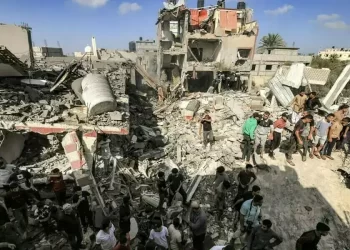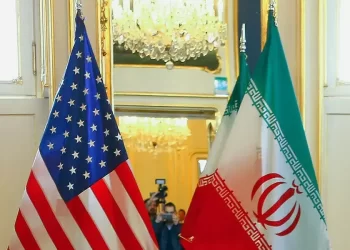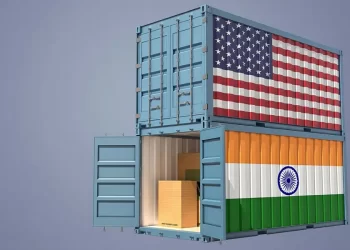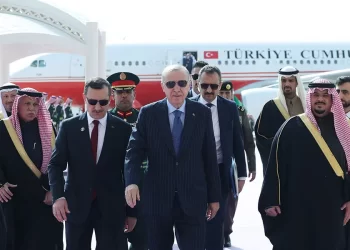TILA, Mexico (news agencies) — It was night when residents of this remote town began to hear gunshots. Then came the sounds of trucks and the voices of men discussing which houses to burn.
Flames began to leap around Tila, a town of about 10,000 people living along steep streets surrounded by mountains in the southern state of Chiapas. Five hours of shooting were followed by three days of townspeople hiding inside their homes waiting for help.
Their only information came from social media platforms that quickly filled with threatening messages. A video circulated showing a boy standing on a roof waving a white flag at a supposed military helicopter.
Finally, soldiers showed up, and some 5,000 people fled from Tila with what they could carry. It was one of the largest displacements of people in southern Mexico since the 1990s and just the latest example of the security challenges awaiting Mexico’s next president.
Leonel Jiménez, a teacher, spent three days holed up with his mother and 12-year-old brother. Each day he called 911 and received the same answer: They were handling it. Three weeks later they are camped out in a nearby town afraid to return.
“We have leaders who don’t want to do anything,” he said.
Tila is one of many towns in Chiapas where decades-old social conflicts mix with armed groups, political corruption and more recently incursions from organized crime in a vacuum of government authority.
Cartels from the northern states of Sinaloa and Jalisco battle for territory across Mexico and for more than a year have brought that fight to Chiapas along its border with Guatemala. They fight to control lucrative smuggling routes for drugs, migrants and guns.
Some nongovernmental groups in the area say it’s not clear if those powerful cartels are taking advantage of a decades-old conflict over land between Indigenous people and others in Tila, but some see signs of their presence. Others, like a local priest, suggested one town faction could have asked a cartel for help against its rivals. Or someone in the dispute could simply be using the cartels’ fearsome reputation to spread terror as has been seen in other states.
In Tila, most doors and windows remain locked. Dozens of soldiers and police guard the town’s entrances and central plaza. Some residents who fled make quick trips back to gather belongings and leave again.
“You have to leave, because there’s no life” here, a tearful Rafael Gutiérrez said as he emptied his home. He made his living driving Tila’s streets playing ads from a large speaker atop his Volkswagen Beetle, but now says, “We can’t live with this anxiety.”
For more than 60 years, Tila has been divided between the Indigenous peasant farmers who work the surrounding communal lands and those who live in the town and hold title to their property. The farmers believe the town is also communal land, which is the root of the conflict.
The farmers supported the 1994 Zapatista uprising, a brief armed insurgency in Chiapas demanding more rights for Indigenous peoples. Some Tila townspeople allied with paramilitary groups that the government used to try to control the guerrilla fighters after peace accords.
Occasional killings and abuses aimed especially against the farmers have continued over the years.
Things intensified in 2015 when the farmers, whose territorial claim to the town’s land climbed to the Supreme Court, expelled Tila’s elected authorities and imposed communal self-government. The high court still hasn’t made a decision in the land case.
On the outskirts of Tila, the farmers gathered last week to discuss the situation. Farmers, who spoke on condition of anonymity, told media that they burned the homes in Tila in the June 4 violence, but said it was a targeted act that followed an attack on one of their communal police patrols. They said the houses burned belonged to people who have allied with the Sinaloa cartel.
“There was shooting because there was no other option,” one farmer said. “We, the legitimate Tila natives, expelled them. Those killers need to get out of here.” He said those targeted were supported by local, state and federal authorities as well as the cartel.
Some of the townspeople who fled Tila contend it is the farmers who brought the cartels into the town’s long-running disputes, accusing them of allying with the Jalisco New Generation cartel. The farmers deny having any ties to the cartel.
President Andrés Manuel López Obrador downplayed the conflict last week, saying it was a local dispute. In May, some Tila residents had asked the president while he was touring Chiapas to intervene, saying they sensed the conflict was about to explode.
That same month, a group of masked people elsewhere in Chiapas stopped the convoy of Claudia Sheinbaum — then a candidate allied with López Obrador and now president-elect — to complain that the government is doing nothing about the area’s security problems.









